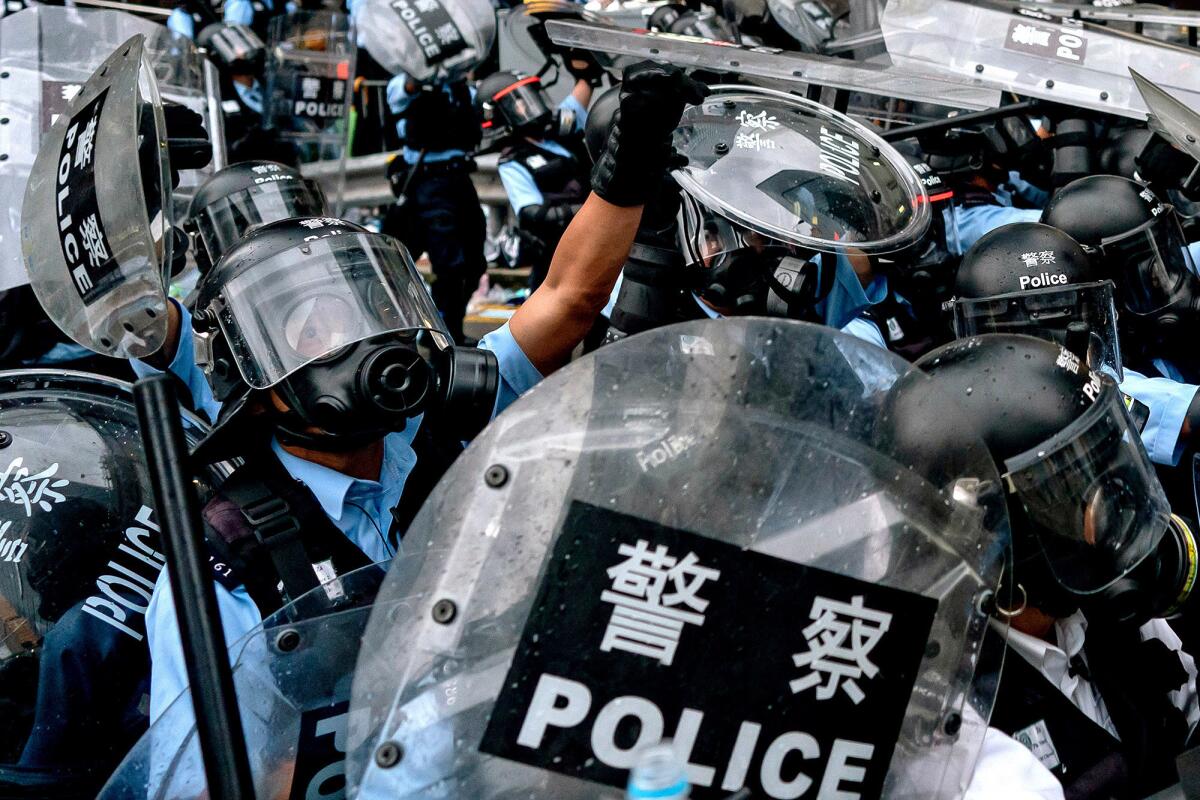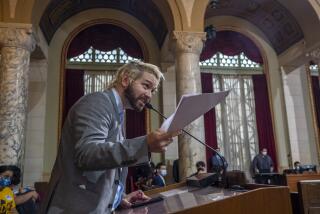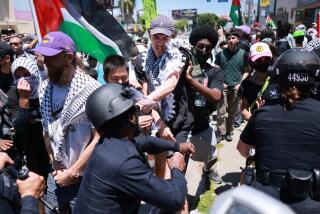Why Hong Kong protesters aren’t cheering this police officer’s arrest

- Share via
SINGAPORE — It seemed for a moment like a breakthrough for demonstrators in Hong Kong — the first arrest of a police officer in connection with the protest movement after months of violent confrontations.
But the arrest had nothing to do with longstanding calls to end impunity for police who use excessive force.
The 31-year-old riot cop, it turned out, was on the side of the protesters. Authorities said he was among eight people, including his girlfriend and her mother, arrested for trying to post pro-democracy signs near a light rail station.
The off-duty officer and his companions, who were caught with electric drills, glue and political posters, apparently had been planning to erect a Lennon Wall, pastiches of artwork, posters and Post-it notes named after a mural in Prague that have been springing up across Hong Kong to rally support for the movement.
“The Police Force attaches great importance to the conduct of its personnel,” a police statement said. “Anyone who commits illegal acts must be dealt with severely.”
Though the arrest was not what demonstrators have been demanding, some put it in a positive light — a sign that authorities are worried about divisions within the 30,000-member force and the prospect of more officers defecting to the side of the protesters.
“Officers who are sympathetic to the protesters can’t share their real thoughts,” said Canaan Wong, a former officer turned protester. “Those that do have to do it very carefully and privately or they’ll get in trouble” with their colleagues.
The police force has increasingly taken the brunt of popular anger for the political crisis that started with widespread demonstrations in June over a proposed bill that would have allowed extraditions to China and has since widened into a bid to preserve Hong Kong’s semi-autonomy from Beijing.
More than 6,500 people, including 41 civil servants, have been arrested in the turmoil.
Protesters want the government to address allegations of criminal misconduct within the police force, including accusations of collusion with organized crime, sexual abuse and assault. One traffic officer tried to run down fleeing protesters on his motorcycle, and another flashed a reporter’s personal identification card on a live news broadcast, violating privacy laws and potentially inviting online harassment.
Public support for the police force has reached record lows in opinion polls, which also show significant support for an independent investigation into officer misconduct. But the Hong Kong government has resisted launching that kind of inquiry.
The government’s chief executive, Carrie Lam, has held that the city’s existing mechanism for investigating police is sufficient. The so-called Independent Police Complaints Council, however, lacks the power to summon witnesses or force authorities to turn over evidence. Those shortcomings led to the resignation of five foreign advisors to the council last month.
An initial report by the council on police conduct was expected to be delivered to Lam early next month. But the council said Friday it would postpone its release because of a legal challenge to the permitted scope of the group’s work.
The Hong Kong Economic Journal, citing insider sources, reported that the review was expected to be critical of the police handling of the protests, particularly over the force’s inability to respond to peaceful and violent demonstrators differently.
The Hong Kong Bar Assn. sent a proposal to Lam this past week imploring her to open an independent commission, saying it was necessary to heal the rift in the city of 7.4 million.
The 53-page proposal recommended investigating 15 separate clashes between protesters and police between June and November as well as 10 broader issues, including the government’s response to the unrest and health issues associated with police weapons such as tear gas. It also calls for looking at the sources of funding for the protesters — which would push the Hong Kong and Beijing governments to support their claims that foreigners are fueling the unrest.
The bar association noted there have been at least 17 commissions of inquiry in Hong Kong since 1966, three of which dealt with police misconduct.
Experts say resistance to an inquiry is strong because Beijing needs to keep the police on its side, said Alfred Wu, an associate professor at the Lee Kuan Yew School of Public Policy at the National University of Singapore.
“In the past, the Hong Kong police were called to maintain order,” Wu said. “Now they’re being asked to preserve the regime.”
The idea of an independent inquiry baffles Chinese cadres, Wu said, because no such thing exists in China.
“I had a senior official call me from Beijing and ask me what an independent commission of inquiry means,” said Wu, a former journalist in China. “They have no idea. They think it means independence from China.”
Demonstrators say they have no intention of ending the protests unless Lam and her superiors in Beijing meet their demands, which include an independent commission and direct elections. There is little sign the government will cave any time soon.
Hong Kong has been administered under a “one country, two systems” framework since the former British crown colony was returned to China in 1997. The arrangement is supposed to guarantee certain liberties for Hong Kongers, such as a free press and freedom of assembly, until 2047.
In a speech before the Legislative Council, Hong Kong’s semi-elected parliament, Lam echoed Chinese communist leaders when she suggested one country, two systems could be retained after 2047 — as long as the city remained loyal to Beijing.
The arrangement is mutually advantageous. Hong Kong acts as a node to global markets accessible to China’s partially closed economy — one that can only exist with a separate legal system and banking system from China’s.
Protesters on the streets, however, already see Hong Kong’s autonomy slipping away.
More to Read
Sign up for Essential California
The most important California stories and recommendations in your inbox every morning.
You may occasionally receive promotional content from the Los Angeles Times.














